中国、ロシア、イラク、イラン、北朝鮮、リビア、シリアの7か国を対象に、米国が核攻撃を想定してるとかで騒いでるヤツの元記事です:
U.S. Works Up Plan for Using Nuclear Arms
(Los Angeles Times 2002.03.09)
http://www.latimes.com/news/nationworld/nation/la-030902bombs.story
Commentary: Secret Plan Outlines the Unthinkable
(Los Angeles Times 2002.03.09)
http://www.latimes.com/news/opinion/la-op-arkinmar10.story
地下政府に核攻撃シミュレーション、あとはバービーごっこで決まりでしょう。
では寝ます。ほーむぺーじの、こうしんで、つかれちゃった、てへ。
U.S. Works Up Plan for Using Nuclear Arms
(Los Angeles Times 2002.03.09)
http://www.latimes.com/news/nationworld/nation/la-030902bombs.story
Commentary: Secret Plan Outlines the Unthinkable
(Los Angeles Times 2002.03.09)
http://www.latimes.com/news/opinion/la-op-arkinmar10.story
地下政府に核攻撃シミュレーション、あとはバービーごっこで決まりでしょう。
では寝ます。ほーむぺーじの、こうしんで、つかれちゃった、てへ。










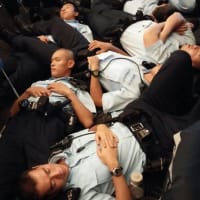

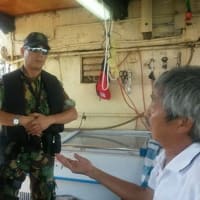
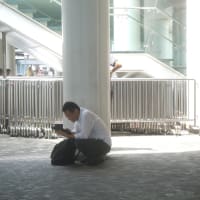
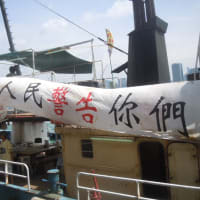



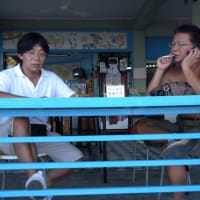
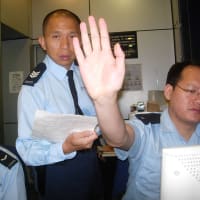
Military: Administration, in a secret report, calls for a strategy against at least seven nations: China, Russia, Iraq, Iran, North Korea, Libya and Syria.
(Los Angeles Times 2002.03.09)
By PAUL RICHTER, Times Staff Writer
WASHINGTON -- The Bush administration has directed the military to prepare contingency plans to use nuclear weapons against at least seven countries and to build smaller nuclear weapons for use in certain battlefield situations, according to a classified Pentagon report obtained by the Los Angeles Times.
The secret report, which was provided to Congress on Jan. 8, says the Pentagon needs to be prepared to use nuclear weapons against China, Russia, Iraq, North Korea, Iran, Libya and Syria. It says the weapons could be used in three types of situations: against targets able to withstand nonnuclear attack; in retaliation for attack with nuclear, biological or chemical weapons; or "in the event of surprising military developments."
A copy of the report was obtained by defense analyst and Times contributor William Arkin. His column on the contents appears in Sunday's editions.
Officials have long acknowledged that they had detailed nuclear plans for an attack on Russia. However, this "Nuclear Posture Review" apparently marks the first time that an official list of potential target countries has come to light, analysts said. Some predicted the disclosure would set off strong reactions from governments of the target countries.
"This is dynamite," said Joseph Cirincione, a nuclear arms expert at the Carnegie Endowment for International Peace in Washington. "I can imagine what these countries are going to be saying at the U.N." Arms control advocates said the report's directives on development of smaller nuclear weapons could signal that the Bush administration is more willing to overlook a long-standing taboo against the use of nuclear weapons except as a last resort. They warned that such moves could dangerously destabilize the world by encouraging other countries to believe that they, too, should develop weapons.
"They're trying desperately to find new uses for nuclear weapons, when their uses should be limited to deterrence," said John Isaacs, president of the Council for a Livable World. "This is very, very dangerous talk . . . Dr. Strangelove is clearly still alive in the Pentagon."
But some conservative analysts insisted that the Pentagon must prepare for all possible contingencies, especially now, when dozens of countries, and some terrorist groups, are engaged in secret weapon development programs.
They argued that smaller weapons have an important deterrent role because many aggressors might not believe that the U.S. forces would use multi-kiloton weapons that would wreak devastation on surrounding territory and friendly populations.
"We need to have a credible deterrence against regimes involved in international terrorism and development of weapons of mass destruction," said Jack Spencer, a defense analyst at the conservative Heritage Foundation in Washington. He said the contents of the report did not surprise him and represent "the right way to develop a nuclear posture for a post-Cold War world."
A spokesman for the Pentagon, Richard McGraw, declined to comment because the document is classified.
Bush administration officials have publicly provided only sketchy details of the nuclear review. They have publicly emphasized the parts of the policy suggesting that the administration wants to reduce reliance on nuclear weapons.
Since the Clinton administration's review is also classified, no specific contrast can be drawn. However, analysts portrayed this report as representing a break with earlier policy.
U.S. policymakers have generally indicated that the United States would not use nuclear weapons against nonnuclear states unless they were allied with nuclear powers. They have left some ambiguity about whether the United States would use nuclear weapons in retaliation after strikes with chemical or nuclear weapons.
The report says the Pentagon should be prepared to use nuclear weapons in an Arab-Israeli conflict, in a war between China and Taiwan, or in an attack from North Korea on the south. They might also become necessary in an attack by Iraq on Israel or another neighbor, it said.
The report says Russia is no longer officially an "enemy." Yet it acknowledges that the huge Russian arsenal, which includes about 6,000 deployed warheads and perhaps 10,000 smaller "theater" nuclear weapons, remains of concern.
Pentagon officials have said publicly that they were studying the need to develop theater nuclear weapons, designed for use against specific targets on a battlefield, but had not committed themselves to that course.
Officials have often spoken of the advantages of using nuclear weapons to destroy the deep tunnel and cave complexes that many regimes have been building, especially since the Persian Gulf War of 1991. Nuclear weapons give off powerful shock waves that can crush structures deep in the Earth, they point out.
Officials argue that large nuclear arms have so many destructive side effects, from blast to heat and radiation, that they become "self-deterring." They contend the Pentagon needs "full spectrum deterrence"--that is, a full range of weapons that potential enemies believe might be used against them.
The Pentagon was actively involved in planning for use of tactical nuclear weapons as recently as the 1970s. But it has moved away from them in the last two decades.
Analysts said the report's reference to "surprising military developments" referred to the Pentagon's fears that a rogue regime or terrorist group might suddenly unleash a wholly unknown weapon that was difficult to counter with the conventional U.S. arsenal.
The administration has proposed cutting the offensive nuclear arsenal by about two-thirds, to between 1,700 and 2,200 missiles, within 10 years. Officials have also said they want to use precision guided conventional munitions in some missions that might have previously been accomplished with nuclear arms.
But critics said the report contradicts suggestions the Bush administration wants to cut the nuclear role.
"This clearly makes nuclear weapons a tool for fighting a war, rather than deterring them," said Cirincione.
If you want other stories on this topic, search the Archives at latimes.com/archives. For information about reprinting this article, go to www.lats.com/rights.
Copyright 2002 Los Angeles Times
A secret policy review of the nation・ nuclear policy puts forth chilling new contingencies for nuclear war.
(Los Angeles Times 2002.03.09)
By WILLIAM M. ARKIN
WASHINGTON -- The Bush administration, in a secret policy review completed early this year, has ordered the Pentagon to draft contingency plans for the use of nuclear weapons against at least seven countries, naming not only Russia and the "axis of evil"--Iraq, Iran, and North Korea--but also China, Libya and Syria.
In addition, the U.S. Defense Department has been told to prepare for the possibility that nuclear weapons may be required in some future Arab-Israeli crisis. And, it is to develop plans for using nuclear weapons to retaliate against chemical or biological attacks, as well as "surprising military developments" of an unspecified nature.
These and a host of other directives, including calls for developing bunker-busting mini-nukes and nuclear weapons that reduce collateral damage, are contained in a still-classified document called the Nuclear Posture Review (NPR), which was delivered to Congress on Jan. 8.
Like all such documents since the dawning of the Atomic Age more than a half-century ago, this NPR offers a chilling glimpse into the world of nuclear-war planners: With a Strangelovian genius, they cover every conceivable circumstance in which a president might wish to use nuclear weapons--planning in great detail for a war they hope never to wage.
In this top-secret domain, there has always been an inconsistency between America's diplomatic objectives of reducing nuclear arsenals and preventing the proliferation of weapons of mass destruction, on the one hand, and the military imperative to prepare for the unthinkable, on the other.
Nevertheless, the Bush administration plan reverses an almost two-decade-long trend of relegating nuclear weapons to the category of weapons of last resort. It also redefines nuclear requirements in hurried post-Sept. 11 terms.
In these and other ways, the still-secret document offers insights into the evolving views of nuclear strategists in Secretary Donald H. Rumsfeld's Defense Department.
While downgrading the threat from Russia and publicly emphasizing their commitment to reducing the number of long-range nuclear weapons, Defense Department strategists promote tactical and so-called "adaptive" nuclear capabilities to deal with contingencies where large nuclear arsenals are not demanded.
They seek a host of new weapons and support systems, including conventional military and cyber warfare capabilities integrated with nuclear warfare. The end product is a now-familiar post-Afghanistan model--with nuclear capability added. It combines precision weapons, long-range strikes, and special and covert operations.
But the NPR's call for development of new nuclear weapons that reduce "collateral damage" myopically ignores the political, moral and military implications--short-term and long--of crossing the nuclear threshold.
Under what circumstances might nuclear weapons be used under the new posture? The NPR says they "could be employed against targets able to withstand nonnuclear attack," or in retaliation for the use of nuclear, biological, or chemical weapons, or "in the event of surprising military developments."
Planning nuclear-strike capabilities, it says, involves the recognition of "immediate, potential or unexpected" contingencies. North Korea, Iraq, Iran, Syria and Libya are named as "countries that could be involved" in all three kinds of threat. "All have long-standing hostility towards the United States and its security partners. All sponsor or harbor terrorists, and have active WMD [weapons of mass destruction] and missile programs."
Other listed scenarios for nuclear conflict are a North Korean attack on South Korea and an Iraqi assault on Israel or its neighbors.
The second important insight the NPR offers into Pentagon thinking about nuclear policy is the extent to which the Bush administration's strategic planners were shaken by last September's terrorist attacks on the World Trade Center and the Pentagon. Though Congress directed the new administration "to conduct a comprehensive review of U.S. nuclear forces" before the events of Sept. 11, the final study is striking for its single-minded reaction to those tragedies.
Heretofore, nuclear strategy tended to exist as something apart from the ordinary challenges of foreign policy and military affairs. Nuclear weapons were not just the option of last resort, they were the option reserved for times when national survival hung in the balance--a doomsday confrontation with the Soviet Union, for instance.
Now, nuclear strategy seems to be viewed through the prism of Sept. 11. For one thing, the Bush administration's faith in old-fashioned deterrence is gone. It no longer takes a superpower to pose a dire threat to Americans.
"The terrorists who struck us on Sept. 11th were clearly not deterred by doing so from the massive U.S. nuclear arsenal," Rumsfeld told an audience at the National Defense University in late January.
Similarly, U.S. Undersecretary of State John R. Bolton said in a recent interview, "We would do whatever is necessary to defend America's innocent civilian population .... The idea that fine theories of deterrence work against everybody ... has just been disproven by Sept. 11."
Moreover, while insisting they would go nuclear only if other options seemed inadequate, officials are looking for nuclear weapons that could play a role in the kinds of challenges the United States faces with Al Qaeda.
Accordingly, the NPR calls for new emphasis on developing such things as nuclear bunker-busters and surgical "warheads that reduce collateral damage," as well as weapons that could be used against smaller, more circumscribed targets--"possible modifications to existing weapons to provide additional yield flexibility," in the jargon-rich language of the review.
It also proposes to train U.S. Special Forces operators to play the same intelligence gathering and targeting roles for nuclear weapons that they now play for conventional weapons strikes in Afghanistan. And cyber-warfare and other nonnuclear military capabilities would be integrated into nuclear-strike forces to make them more all-encompassing.
As for Russia, once the primary reason for having a U.S. nuclear strategy, the review says that while Moscow's nuclear programs remain cause for concern, "ideological sources of conflict" have been eliminated, rendering a nuclear contingency involving Russia "plausible" but "not expected."
"In the event that U.S. relations with Russia significantly worsen in the future," the review says, "the U.S. may need to revise its nuclear force levels and posture."
When completion of the NPR was publicly announced in January, Pentagon briefers deflected questions about most of the specifics, saying the information was classified. Officials did stress that, consistent with a Bush campaign pledge, the plan called for reducing the current 6,000 long-range nuclear weapons to one-third that number over the next decade. Rumsfeld, who approved the review late last year, said the administration was seeking "a new approach to strategic deterrence," to include missile defenses and improvements in nonnuclear capabilities.
Also, Russia would no longer be officially defined as "an enemy."
Beyond that, almost no details were revealed.
The classified text, however, is shot through with a worldview transformed by Sept. 11. The NPR coins the phrase "New Triad," which it describes as comprising the "offensive strike leg," (our nuclear and conventional forces) plus "active and passive defenses,"(our anti-missile systems and other defenses) and "a responsive defense infrastructure" (our ability to develop and produce nuclear weapons and resume nuclear testing). Previously, the nuclear "triad" was the bombers, long-range land-based missiles and submarine-launched missiles that formed the three legs of America's strategic arsenal.
It calls for "a new strike system" using four converted Trident submarines, an unmanned combat air vehicle and a new air-launched cruise missile as potential new weapons.
Beyond new nuclear weapons, the review proposes establishing what it calls an "agent defeat" program, which defense officials say includes a "boutique" approach to finding new ways of destroying deadly chemical or biological warfare agents, as well as penetrating enemy facilities that are otherwise difficult to attack. This includes, according to the document, "thermal, chemical or radiological neutralization of chemical/biological materials in production or storage facilities."
Bush administration officials stress that the development and integration of nonnuclear capabilities into the nuclear force is what permits reductions in traditional long-range weaponry. But the blueprint laid down in the review would expand the breadth and flexibility of U.S. nuclear capabilities.
In addition to the new weapons systems, the review calls for incorporation of "nuclear capability" into many of the conventional systems now under development. An extended-range conventional cruise missile in the works for the U.S. Air Force "would have to be modified to carry nuclear warheads if necessary." Similarly, the F-35 Joint Strike Fighter should be modified to carry nuclear weapons "at an affordable price."
The review calls for research to begin next month on fitting an existing nuclear warhead into a new 5,000-pound "earth penetrating" munition.
Given the advances in electronics and information technologies in the past decade, it is not surprising that the NPR also stresses improved satellites and intelligence, communications, and more robust high-bandwidth decision-making systems.
Particularly noticeable is the directive to improve U.S. capabilities in the field of "information operations," or cyber-warfare. The intelligence community "lacks adequate data on most adversary computer local area networks and other command and control systems," the review observes. It calls for improvements in the ability to "exploit" enemy computer networks, and the integration of cyber-warfare into the overall nuclear war database "to enable more effective targeting, weaponeering, and combat assessment essential to the New Triad."
In recent months, when Bush administration officials talked about the implications of Sept. 11 for long-term military policy, they have often focused on "homeland defense" and the need for an anti-missile shield. In truth, what has evolved since last year's terror attacks is an integrated, significantly expanded planning doctrine for nuclear wars.
_ _ _
William M. Arkin is a senior fellow at the Johns Hopkins University School of Advanced International Studies in Washington and an adjunct professor at the U.S. Air Force School of Advanced Airpower Studies. He is also a consultant to a number of nongovernmental organizations and a regular contributor to the Bulletin of the Atomic Scientists. Officials are looking for nuclear weapons that could help against a foe like Al Qaeda.
If you want other stories on this topic, search the Archives at latimes.com/archives. For information about reprinting this article, go to www.lats.com/rights.
Copyright 2002 Los Angeles Times
***香港
■明報(要登録)
一面トップ
兩岸若開戰 美擬動核武
(要聞 2002.03.10)
http://full.mingpaonews.com/20020310/gaa1hr.htm
美擬定動用核武計劃(図)
(要聞 2002.03.10)
http://full.mingpaonews.com/20020310/10gat.gif
「北京不打無把握之仗」
(要聞 2002.03.10)
http://full.mingpaonews.com/20020310/gaa2r.htm
核武專家責美亂點火頭
(要聞 2002.03.10)
http://full.mingpaonews.com/20020310/gaa3r.htm
核彈實戰僅2次
(要聞 2002.03.10)
http://full.mingpaonews.com/20020310/gaa4r.htm
■明報 速報版
報道:美擬兩岸戰爭用核武
(2002.03.09 19:37HKT)
http://www.mpinews.com/content.cfm?newsid=200203091937ca61937a
美否認擬對中俄動核武
(2002.03.10 09:59HKT)
http://www.mpinews.com/content.cfm?newsid=200203100959ca70959w
■蘋果日報
国際欄トップ
布殊新策略小核彈對付中俄
(國際 2002.03.10)
http://appledaily.atnext.com/template/apple/art_main.cfm?sec_id=15335&art_id=2477146&showdate=20020310
(國際欄紙面画像)
(國際 2002.03.10)
http://appledaily.atnext.com/adoinfile/20020310/head_15335.jpg
遭美國針對的七國核武力量(図)
(國際 2002.03.10)
http://appledaily.atnext.com/images/apple-photos/640pix/20020310/Article_int/intx201.gif
低當量核彈對付地堡
(國際 2002.03.10)
http://appledaily.atnext.com/template/apple/art_main.cfm?sec_id=15335&showdate=20020310&art_id=2477148
核武已是真正戰爭工具
(國際 2002.03.10)
http://appledaily.atnext.com/template/apple/art_main.cfm?sec_id=15335&showdate=20020310&art_id=2477152
「新鐵三角」針對新威脅
(國際 2002.03.10)
http://appledaily.atnext.com/template/apple/art_main.cfm?sec_id=15335&showdate=20020310&art_id=2477156
■東方日報(当日のみ)
国際欄トップ
中俄北韓美列核攻撃對象
(國際 2002.03.10)
被美列為核武攻撃目標的國家(図)
(國際 2002.03.10)
布殊核戰思維大翻新
(國際 2002.03.10)
■太陽報
国際欄トップ
兩岸[イ尚]開戰美核武介入--華府核應變計畫 中俄七國成目標
(國際 2002.03.10)
http://the-sun.com.hk/channels/news/20020310/20020310015737_0001.html
八國核武實力比併(図)
(國際 2002.03.10)
http://the-sun.com.hk/channels/news/20020310/20020310015737_0001_1.html
隨時核攻撃加劇核競賽
(國際 2002.03.10)
http://the-sun.com.hk/channels/news/20020310/20020310015737_0001_2.html
■Orisun.com(東方日報と太陽報の速報版)
美報指布殊擬訂核武應變計畫對付中俄
(2002.03.10 06:45HKT)
http://www.orisun.com/int/ncbrkc00_20020310064528.html
美國防部否認必要時對中俄使用核武
(2002.03.10 18:17HKT)
http://www.orisun.com/china/ncbrkb00_20020310181746.html
■大公報
国際欄トップ
美制定對華發動核戰計劃
(國際 2002.03.10)
http://202.153.114.133/news/20020310/big5/ym0.cht
■South China Morning Post(有料)
New nuclear posture proposed
(World 2002.03.11)
http://world.scmp.com/worldnews/ZZZ8HZ8XCYC.html
■TOM.COM(ウェブのみ)
報道指華府要求國防部準備核武以備不時之需
(2002.03.09 19:51HKT)
http://hk.tom.com/newsfinance/news_content.jsp?CID=MT200203092021397828&navID=15
美國防部否認有使用核武的目標國家名單
(2002.03.10 11:17HKT)
http://hk.tom.com/newsfinance/news_content.jsp?CID=MT200203101219277919&navID=15
再有美傳媒指華府指示核武[目苗]準中國北韓等國
(2002.03.10 18:23HKT)
http://hk.tom.com/newsfinance/news_content.jsp?CID=MT200203102019257997&navID=15
美應急措施:緊急情況下可對七國使用核武器
(2002.03.10 09:37CHT)
http://www.peopledaily.com.cn/BIG5/guoji/22/86/20020310/683561.html
美辯解:緊急情況使用核武文件并非行動藍圖
(2002.03.11 08:32CHT)
http://www.peopledaily.com.cn/BIG5/guoji/22/86/20020311/683979.html
■新浪網(ウェブのみ)
美机密文件披露:緊急情况下可対七国使用核武器
(2002.03.10 09:59CHT)
http://news.sina.com.cn/w/2002-03-10/0959502097.html
美媒体称美国擬用核武対付中俄等国 美国軍方澄清
(2002.03.10 14:19CHT)
http://news.sina.com.cn/w/2002-03-10/1419502280.html
■搜狐(ウェブのみ)
媒体披露布什已下令軍方准備対至少七国家用核武
(2002.03.10 09.51CHT)
http://news.sohu.com/51/50/news148105051.shtml
傳媒指美擬用核武対付中俄等国 軍方作出澄清
(2002.03.10 14:24CHT)
http://news.sohu.com/95/77/news148107795.shtml
一面トップ
一旦台海衝突 美可能動用核武
(焦點新聞 2002.03.10)
http://news.chinatimes.com/Chinatimes/newslist/newslist-content/0,3546,110501+112002031000001,00.html
中共學者:美將引爆[口/力]波核競賽
(焦點新聞 2002.03.10)
http://news.chinatimes.com/Chinatimes/newslist/newslist-content/0,3546,110501+112002031000002,00.html
中共戰術核武 實戰性高
(焦點新聞 2002.03.10)
http://news.chinatimes.com/Chinatimes/newslist/newslist-content/0,3546,110501+112002031000003,00.html
布希核武方案 確有其事
(焦點新聞 2002.03.10)
http://news.chinatimes.com/Chinatimes/newslist/newslist-content/0,3546,110501+112002031000004,00.html
華府學者:911改變美核武策略
(焦點新聞 2002.03.10)
http://news.chinatimes.com/Chinatimes/newslist/newslist-content/0,3546,110501+112002031000005,00.html
戰略核武與戰術核武
(焦點新聞 2002.03.10)
http://news.chinatimes.com/Chinatimes/newslist/newslist-content/0,3546,110501+112002031000006,00.html
美核武方案密件曝光 「爆」爭議
(焦點新聞 2002.03.11)
http://news.chinatimes.com/Chinatimes/newslist/newslist-content/0,3546,110501+112002031100006,00.html
「美國防部核武態勢評估報告」 「新三位一體」 美轉型應變
(焦點新聞 2002.03.11)
http://news.chinatimes.com/Chinatimes/newslist/newslist-content/0,3546,110501+112002031100007,00.html
核武用於台海 國内學者反對
(焦點新聞 2002.03.11)
http://news.chinatimes.com/Chinatimes/newslist/newslist-content/0,3546,110501+112002031100008,00.html
日本專家:美不致在台海用核武
(焦點新聞 2002.03.11)
http://news.chinatimes.com/Chinatimes/newslist/newslist-content/0,3546,110501+112002031100009,00.html
核武評估報告曝光 紐約時報:美外交面臨立即衝撃
(焦點新聞 2002.03.11)
http://news.chinatimes.com/Chinatimes/newslist/newslist-content/0,3546,110501+112002031100010,00.html
核武威脅俄國、伊朗表達關切
(焦點新聞 2002.03.11)
http://news.chinatimes.com/Chinatimes/newslist/newslist-content/0,3546,110501+112002031100011,00.html
美核武政策大轉向?林中斌:應未達政策層次
(焦點新聞 2002.03.11)
http://news.chinatimes.com/Chinatimes/newslist/newslist-content/0,3546,110501+112002031100012,00.html
台美日安保會議 下月底華府召開
(大陸新聞 2002.03.11)
http://news.chinatimes.com/Chinatimes/newslist/newslist-content/0,3546,110505+112002031100054,00.html
■中時電子報(中國時報、工商時報、中時晩報ウェブ版)
傳美國可能對中共、俄羅斯等七個國家動用核武
(2002.03.10 19:15TWT)
http://news.chinatimes.com/Chinatimes/newslist/newslist-content/0,3546,110104+112002031000450,00.html
英媒體報導美國準備台海有事時對大陸動用核武
(2002.03.10 21:33TWT)
http://news.chinatimes.com/Chinatimes/newslist/newslist-content/0,3546,110104+112002031000465,00.html
國外媒體報導台海衝突美將動用核武 國防部不評論
(2002.03.10 23:18TWT)
http://news.chinatimes.com/Chinatimes/newslist/newslist-content/0,3546,110101+112002031000475,00.html
■自由時報
一面トップ
台海若有軍事衝突 美可能以核武對付中國
(新聞焦點 2002.03.10)
http://www.libertytimes.com.tw/2002/new/mar/10/today-t1.htm
■中央日報
泛邪惡軸心? 美指俄「中」非核武目標
(重要新聞 2002.03.11)
http://www.cdn.com.tw/daily/2002/03/11/text/910311ab.htm
勿讓臺海籠罩在核戰陰影之下
(本報社論 2002.03.11)
http://www.cdn.com.tw/daily/2002/03/11/text/910311b1.htm
核武要打誰?
(本報專欄 2002.03.11)
http://www.cdn.com.tw/daily/2002/03/11/text/910311b2.htm
■Taipei Times
Report says Bush may consider use of nuclear weapons
(Front Page 2002.03.10)
http://www.taipeitimes.com/news/2002/03/10/story/0000127069
Pentagon rejects reports of a White House nuclear plan
(Front Page 2002.03.11)
http://www.taipeitimes.com/news/2002/03/11/story/0000127192
■China Post
U.S. mulls nuclear scenarios with over 7 countries
(Front Page 2002.03.10)
http://www.chinapost.com.tw/detail.asp?ID=24090&GRP=A
Pentagon denies targeting Russia, PRC, Iraq
(Front Page 2002.03.11)
http://www.chinapost.com.tw/detail.asp?ID=24117&GRP=A
■東森新聞報(ウェブのみ)
美開出可動用核武的7國家 包括台海衝突在内
(2002.03.10 08:37TWT)
http://www.ettoday.com/2002/03/10/328-1273398.htm
美以核武保台? 五角大廈澄清:報導誤導
(2002.03.10 11:27TWT)
http://www.ettoday.com/2002/03/10/91-1273481.htm
美以核武保衛台灣? 林郁方:可能性不大
(2002.03.10 11:42TWT)
http://www.ettoday.com/2002/03/10/703-1273478.htm
美國防部密[才當]/中國核生化武器計畫 中、美關係持續緊張
(2002.03.10 12:32TWT)
http://www.ettoday.com/2002/03/10/703-1273523.htm
美國防部密[木當]/中國仍維持生化作戰計畫 目的在防美國圍堵
(2002.03.10 12:35TWT)
http://www.ettoday.com/2002/03/10/703-1273522.htm
多維快訊:美國準備對中俄等七國發動核襲撃
(2002.03.09 21:59HKT)
http://www1.chinesenewsnet.com/cgi-bin/newsfetch.cgi?unidoc=big5&src=MainNews/NorthAmerica/Sat_Mar__9_08_14_08_2002.html
多維詳訊:美報披露台海開戰美國或使用核武器干渉
(2002.03.09 22:20HKT)
http://www1.chinesenewsnet.com/cgi-bin/newsfetch.cgi?unidoc=big5&src=MainNews/NorthAmerica/Sat_Mar__9_09_20_34_2002.htm
多維詳訊:美報披露台海開戰美國或使用核武器干渉
(2002.03.09 22:57HKT)
http://www1.chinesenewsnet.com/cgi-bin/newsfetch.cgi?unidoc=big5&src=MainNews/NorthAmerica/Sat_Mar__9_09_20_34_2002.html
中國學者:美將引爆[口/力]波核競賽
(2002.03.10 04:45HKT)
http://www1.chinesenewsnet.com/cgi-bin/newsfetch.cgi?unidoc=big5&src=SinoNews/Mainland/Sat_Mar__9_15_37_38_2002.html
中國戰術核武實戰性高
(2002.03.10 05.18HKT)
http://www1.chinesenewsnet.com/cgi-bin/newsfetch.cgi?unidoc=big5&src=SinoNews/Mainland/Sat_Mar__9_15_51_35_2002.html
美國學者:911改變美核武策略
(2002.03.10 05:18HKT)
http://www1.chinesenewsnet.com/cgi-bin/newsfetch.cgi?unidoc=big5&src=MainNews/NorthAmerica/Sat_Mar__9_15_56_56_2002.html
布什新策略小核彈對付中俄
(2002.03.10 06:03HKT)
http://www1.chinesenewsnet.com/cgi-bin/newsfetch.cgi?unidoc=big5&src=MainNews/NorthAmerica/Sat_Mar__9_16_35_18_2002.html
核武已是真正戰爭工具
(2002.03.10 11:33HKT)
http://www1.chinesenewsnet.com/cgi-bin/newsfetch.cgi?unidoc=big5&src=MainNews/Topics/Sat_Mar__9_22_22_15_2002.html
「新鐵三角」針對新威脅
(2002.03.10 11:33HKT)
http://www1.chinesenewsnet.com/cgi-bin/newsfetch.cgi?unidoc=big5&src=Forums/BackStage/Sat_Mar__9_22_27_32_2002.html
傳媒指美擬用核武對付中俄等國軍方作出澄清
(2002.03.10 14:03HKT)
http://www1.chinesenewsnet.com/cgi-bin/newsfetch.cgi?unidoc=big5&src=MainNews/NorthAmerica/cna-168305.html
發生意外衝突時中共將成華府動用核武對象
(2002.03.11 03:50HKT)
http://www1.chinesenewsnet.com/cgi-bin/newsfetch.cgi?unidoc=big5&src=MainNews/NorthAmerica/Sun_Mar_10_14_50_22_2002.html
核武威脅俄國、伊朗表達關切
(2002.03.11 05:30HKT)
http://www1.chinesenewsnet.com/cgi-bin/newsfetch.cgi?unidoc=big5&src=MainNews/Topics/Sun_Mar_10_16_18_13_2002.html
美國核武方案密件曝光「爆」爭議
(2002.03.11 09:21HKT)
http://www1.chinesenewsnet.com/cgi-bin/newsfetch.cgi?unidoc=big5&src=Forums/BackStage/Sun_Mar_10_20_17_21_2002.html
美擬用核武對付中俄等國?美高官出面辯解
(2002.03.11 09.48HKT)
http://www1.chinesenewsnet.com/cgi-bin/newsfetch.cgi?unidoc=big5&src=MainNews/NorthAmerica/cna-168474.html
美計劃對俄羅斯等過動用核武俄政要嚴辭[才平]撃
(2002.03.11 09.48HKT)
http://www1.chinesenewsnet.com/cgi-bin/newsfetch.cgi?unidoc=big5&src=MainNews/NorthAmerica/cna-168508.html
米国、7カ国対象に「核使用シナリオ」 米紙報道
(朝刊 総合欄 2002.03.10)
■朝日新聞 速報版
米政権、中国など7カ国への核攻撃策定を指示 米紙報道
(速報 国際欄 2002.03.10 01:55JST)
http://www.asahi.com/international/update/0309/010.html
生物化学兵器対策で先制核も、米核戦略見直し 米紙報道
(速報 国際欄 2002.03.10 22:24JST)
http://www.asahi.com/international/update/0310/009.html
■産経新聞 印刷版(当日のみ)
7カ国を核の対象 米、有事で使用想定
(朝刊 一面 2002.03.10)
核兵器積極使用の見方否定 米国防総省
(朝刊(休刊日発行版) 国際欄 2002.03.11)
http://www.sankei.co.jp/news/morning/11int002.htm
核兵器積極使用の見方否定 米国防総省
(夕刊 国際欄 2002.03.11)
■産経新聞 速報版
核の使用計画策定を命令 米紙報道
(速報 国際欄 2002.03.10 00:18JST)
http://www.sankei.co.jp/news/020310/0310kok005.htm
■日本経済新聞 速報版
米政府、北朝鮮など7カ国に核使用想定・米紙
(速報 国際欄 2002.03.09)
http://www.nikkei.co.jp/kaigai/us/20020309df1i082909.html
生物兵器対策で核先制使用も、米核戦略見直しで・米紙
(速報 国際欄 2002.03.11 02:21JST)
http://www.nikkei.co.jp/news/kaigai/20020310CIII102010.html
米国務長官、核使用計画の存在否定せず
(速報 国際欄 2002.03.11 19:01JST)
http://www.nikkei.co.jp/news/kaigai/20020311CF1I012111.html
■毎日新聞 速報版
米核使用計画:イラク、北朝鮮など7カ国対象 米紙報道
(速報 国際欄 2002.03.09 22:11JST)
http://www.mainichi.co.jp/news/selection/archive/200203/09/20020310k0000m030092001c.html
■読売新聞 速報版
米、7か国へ核使用計画策定へ…米紙報道
(速報 国際欄 2002.03.09 23:27JST 2002.03.10 01:53JST差替)
http://www.yomiuri.co.jp/05/20020309it12.htm
イラン、米の核使用計画を非難
(速報 国際欄 2002.03.11 00:03JST)
http://www.yomiuri.co.jp/05/20020310id26.htm